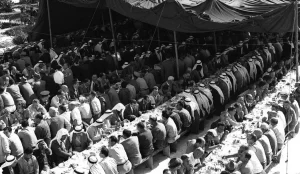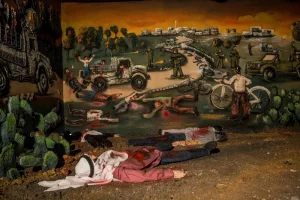Israeli Soldiers in 1956 Kafr Qasem Massacre Believed They Were Doing the Right Thing

Israeli officials and local residents attend a sulha event in Kafr Qasem in 1957, a year after the massacre. The sulha tradition represents reconciliation.
Tom Segev writes in Haaretz, 31 July 2022, “The minutes of the Kafr Qasem trial are so shocking and upsetting not because they reveal information that is unfamiliar to history, but precisely because Israeli war crimes play such a marginal role in the formation of the state’s seminal principles.
Israel’s Hafarperet (Mole) Plan, designed to expel Arabs from the so-called “triangle” of Arab towns, has been known for 20 years, ever since the person who wrote it under the instructions of then-Chief of Staff Moshe Dayan revealed its existence. His name was Avraham (Abrasha) Tamir, the head of the IDF Central Command’s operations division at the time, later becoming an oddity in Israel’s political world.
The idea behind the plan was to exploit a future war with Jordan for the evacuation of Arab villages in this triangle. Some of the population would flee to Jordan, while others would be sent to detention camps in Israel. Ruvik Rosenthal, a journalist, author and linguist, quoted Tamir in a book he wrote, “Kafr Qasem, Facts and Myths,” published (in Hebrew) by Hakkibutz Hameuchad in 2000.
Three years ago, historian Adam Raz published a “political biography” of the massacre, committed in Kafr Qasem by Border Policemen on the afternoon of October 29, 1956.
The Sinai (Suez) Campaign began that day, and curfew was imposed on Arab villages in the triangle, starting earlier than the initial announcement. Fifty-three villagers who did not know about the curfew and were returning home from work after it was enacted were shot to death. Between the massacres of Deir Yassin in 1948 and Sabra and Shatila in 1982, nothing was more horrifyingly emblematic of the murderous nature of the battle over the Land of Israel.

A mural depicting the 1956 massacre at a museum in Qafr Kasem
The Kafr Qasem massacre was recognized in later years as a tragic exception that should never have happened. The Hafarperet Plan was consigned to oblivion, along with other plans for thinning out the country’s Arab population. Adam Raz tried to prove a link between the plan and the Kafr Qasem massacre. The Israel Defense Forces archives refuse to release any document relating to this incident. Raz demanded to see, among other documents, the minutes of the trials of the policemen who perpetrated the massacre, and following a legal and public campaign that lasted years, these minutes were declassified on Friday.
The exact link between the Hafarperet Plan and the massacre is not important. What is important is that both of them were imbued with the same spirit. The people who murdered these villagers did not act with the impassivity of a soldier obeying orders. They believed they were doing something that had to be done, in the spirit of their commanders. The minutes demonstrate this well, and therein lies their main significance.
In 1956, many Israelis were still living the events of the War of Independence. Israeli Arabs were deemed enemies. They were constricted by the rules of a military government, an arbitrary and corrupt mechanism whose existence expressed Ben-Gurion’s attitude to the Arabs of this country. He saw them as an obstacle and threat, and did not believe in the possibility of reaching peace with them. He was in support of various transfer plans.
One would like to believe that the exposure and condemnation of war crimes would lead to the prevention of such crimes in the future. The obverse is also true: Anyone concealing war crimes is covering them up and legitimizing them. Public contrition about war crimes sometimes contributes to the consolidation of basic humanitarian principles. But this is particularly difficult in Israel, not just because of the perpetual need to defend against Arab enmity, but also because of the need to believe in the righteousness of the country. This is an ideological, Zionist, existential need. If we aren’t just, we won’t remain here, it is taught in Israeli schools.

Kafr Qasem residents attend a memorial event on the anniversary of the massacre, in 2019
In the wake of the trial of the Kafr Qasem murderers, it seemed as though Israel was committing itself to an almost revolutionary doctrine in the annals of human belligerence. This was the “black flag” doctrine. Such a flag must fly over any “patently illegal command,” which a soldier must identify and refuse to obey. This was the ethical lesson Israelis should have learned from the Holocaust. This is the basis for the claim that the IDF is the most moral army in the world.
There was a time in which every IDF soldier was supposed to hear about the “black flag” in the course of his or her service, at least once. I know of at least one soldier who didn’t. However, it seems that the “black flag doctrine” was also consigned to oblivion. Ultimately, this doctrine reflected a yearning for a Zionism that was more moral than it could be.
In the meantime, everything has changed. The oppression of Palestinians in the occupied territories has trashed even the pretensions of representing a just (Israeli) existence. Only a few Israelis pay attention to this difficulty, as demonstrated by one of the online reactions to the publication of the minutes of the Kafr Qasem trial: “And what about the minutes of the Kishinev pogroms?” This article is printed in its entirety.
